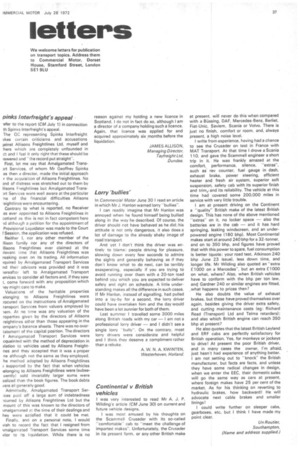Continental v British vehicles
Page 39

If you've noticed an error in this article please click here to report it so we can fix it.
I was very interested to read Mr A, J. P. Wilding's article (CM June 30) on current and future vehicle designs.
I was most amused by his thoughts on the Scammell Crusader with its so-called "comfortable" cab to "meet the challenge of imported makes". Unfortunately, the Crusader in its present form, or any other British make
at present, will never do this when compared with a Bussing, DAF, Mercedes-Benz, Berliet, Fiat-Unic, Saviem, Scania or Volvo. There is just no finish, comfort or room, and, always present, a high noise level,
I write from experience, having had a chance to see the Crusader on test in France with MAT Transport. At that time I drove a Scania 110, and gave the Scammeli engineer a short trip in it. He was frankly amazed at the comfort, performance, silence, "extras", such as' rev counter, fuel gauge in dash, exhaust brake, power steering, efficient heater and fresh air system, superior soft suspension, safety cab with its superior finish and trim, and its reliability. The vehicle at this time had covered some 200,000 miles in service with very little trouble.
I am at present driving on the Continent a "quality" British make of the latest British design. This has none of the above mentioned "extras" on it, no locker space — also the batteries are in the cab — and it has hard springing, leaking windscreen, and an underpowered engine 1180 bhp). Most Continental makes start at around 240 bhp for a 32-tonner, and on to 350 bhp, and figures have proved that with this power to spare, fuel consumption is better (quote: your road test. Atkinson 240 bhp June 23 issue), less down time, and longer life. Mr Wilding also quoted an "extra 1000 on a Mercedes", but an extra 1000 on what, where? Also, when British vehicles have to conform with the bhp per ton law, and Gardner 240 or similar engines are fitted, . what happens to prices then?
He also doubts the value of exhaust brakes, but these have proved themselves over again, besides giving the driver extra safety, and cutting maintenance costs (eg: Richard Read (Transport) Ltd and Telma retarders): and also which British engine can reach 350 bhp at present?
He also quotes that the latest British Leyland and ERF cabs are perfectly satisfactory for British operation. Yes, for monkeys or jockeys to drive! At present the poor British driver, and in many cases the owner, I'm afraid, just hasn't had experience of anything better. I am not setting out to -knock" the British manufacturer, but facts are facts, and unless they have some radical changes in design. when we enter the EEC, their domestic sales will go the same way as cars at present, where foreign makes have 25 per cent of the market. As for his thinking on reverting to hydraulic brakes, how backward! He will advocate next cable brakes and smaller linings!
I could write further on sleeper cabs, gearboxes, etc, but I think I have made my point clear.
Un Routier, Southampton, (Name and address supplied.)




























































































